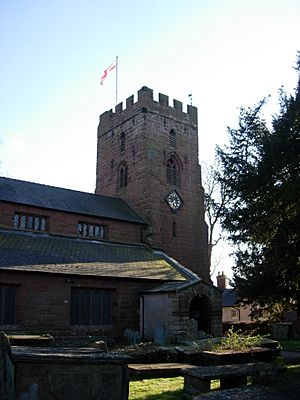St Chad's Church, Farndon facts for kids
Quick facts for kids St Chad's Church, Farndon |
|
|---|---|

St Chad's Church, Farndon, from the northeast
|
|
| Lua error in Module:Location_map at line 420: attempt to index field 'wikibase' (a nil value). | |
| OS grid reference | SJ 413,544 |
| Location | Farndon, Cheshire |
| Country | England |
| Denomination | Anglican |
| Website | St Chad's, Farndon |
| History | |
| Status | Parish church |
| Dedication | Chad of Mercia |
| Events | Damaged during the Civil War |
| Architecture | |
| Functional status | Active |
| Heritage designation | Grade II* |
| Designated | 1 March 1967 |
| Architect(s) | Kelly and Edwards, John Douglas |
| Architectural type | Church |
| Style | Gothic |
| Specifications | |
| Materials | Red sandstone, grey slate roofs |
| Administration | |
| Parish | Farndon, St Chad |
| Deanery | Malpas |
| Archdeaconry | Chester |
| Diocese | Chester |
| Province | York |
St Chad's Church is a historic church located in the village of Farndon, Cheshire, England. It is an active Anglican parish church, meaning it is part of the Church of England. This beautiful church is considered a very important building. It is officially listed as a Grade II* building, which means it has special historical or architectural interest. The church works closely with St Mary's Church in Coddington.
Contents
History of St Chad's Church
A church has stood on this spot for a very long time. Records from the Domesday Book, a famous survey from 1086, show a church was here then. It is likely that even older churches, built in the Saxon style, existed before that. The bottom part of the church tower and the overall shape of the building date back to the 1300s.
Around 1622, a historian named Webb described it as a "fair new church." However, during the English Civil War (1642-1651), the church was badly damaged. In 1643, soldiers fighting for Parliament, called Parliamentarians, were using the church as a base. Royalist soldiers attacked them, and during the battle, the church caught fire. The Parliamentarians continued to use it until 1645, when they left it empty and ruined.
Most of the church, except for the tower, was completely rebuilt in 1658 by William Barnston. More repairs and updates happened in the 1800s and 1900s. The 19th-century work was done by architects Kelly and Edwards. A small part, the southeast chapel, was worked on by John Douglas.
Architecture and Design
Outside the Church
St Chad's Church is built from red sandstone and has grey slate roofs. The lower three levels of the tower are from the 1300s, while the very top part was added in the 1600s. The church's layout includes a main hall called a nave with a clerestory (a high section with windows). It also has side sections called north and south aisles, a chancel (the area around the altar), and a porch on the north side. A vestry (a room for clergy) and the Barnston chapel stick out from the east end of the south wall. The tower stands at the west end of the church.
Inside the Church
Inside, you can find some interesting old pieces. There is a holy table from the 1600s and a large parish chest dated 1729. Three special boards, called benefaction boards, list gifts given to the church in 1672, 1786, and 1838.
In the Barnston chapel, there is a special window called the Civil War window. It shows pictures of some of the Royalist figures from Cheshire, including Richard Grosvenor and William Barnston. The chapel also has memorials on the walls for members of the Barnston family. These include two memorial boards created by Randle Holme.
The church has a set of eight bells, all made in 1841 by John Taylor and Company. The church's official records, called parish registers, start from 1603. The records of the churchwardens (people who help manage the church) begin in 1744.
Things Outside the Church
In the churchyard, there are two old stone tombs called table tombs. They are made of yellow sandstone and date back to the early 1700s. One tomb has an image of an hourglass, which reminds people that time passes quickly. The other has a skull and crossbones, a symbol often used in the past to remind people of death. A sundial in the churchyard, which tells time using the sun, is dated 1793.
The churchyard is also home to war graves for two British soldiers who died in World War I. Their names are Sergeant Joseph Easter and Private Thomas Harrison.
See also
- Listed buildings in Farndon, Cheshire
- List of church restorations, amendments and furniture by John Douglas
 | Ernest Everett Just |
 | Mary Jackson |
 | Emmett Chappelle |
 | Marie Maynard Daly |

